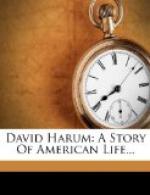wa’n’t nothin’ for it but to come
back here to Homeville an’ make the most o’
what the’ was left—an’ that’s
what he done, let alone that he didn’t make the
most on’t to any pertic’ler extent.
Mis’ Cullom, his wife, wa’n’t no
help to him. She was a city woman an’ didn’t
take to the country no way, but when she died it broke
old Billy up wus ‘n ever. She peaked an’
pined, an’ died when Billy P. was about fifteen
or so. Wa’al, Billy P. an’ the old
man wrastled along somehow, an’ the boy went
to collidge fer a year or so. How they ever got
along ‘s they did I dunno. The’ was
a story that some far-off relation left old Billy
some money, an’ I guess that an’ what
they got off’m what farms was left carried ’em
along till Billy P. was twenty-five or so, an’
then he up an’ got married. That was the
crownin’ stroke,” remarked David.
“She was one o’ the village girls—respectable
folks, more ‘n ordinary good lookin’ an’
high steppin’, an’ had had some schoolin’.
But the old man was prouder ’n a cock-turkey,
an’ thought nobody wa’n’t quite good
enough fer Billy P., an’ all along kind o’
reckoned that he’d marry some money an’
git a new start. But when he got married—on
the quiet, you know, cause he knowed the old man would
kick—wa’al, that killed the trick,
an’ the old man into the bargain. It took
the gumption all out of him, an’ he didn’t
live a year. Wa’al, sir, it was curious,
but, ’s I was told, putty much the hull village
sided with the old man. The Culloms was kind o’
kings in them days, an’ folks wa’n’t
so one-man’s-good’s-anotherish as they
be now. They thought Billy P. done wrong, though
they didn’t have nothin’ to say ‘gainst
the girl neither—an’ she’s very
much respected, Mis’ Cullom is, an’ as
fur’s I’m concerned, I’ve alwus guessed
she kept Billy P. goin’ full as long ’s
any one could. But ’t wa’n’t
no use—that is to say, the sure thing come
to pass. He had a nom’nal title to a good
deal o’ prop’ty, but the equity in most
on’t if it had ben to be put up wa’n’t
enough to pay fer the papers. You see, the’
ain’t never ben no real cash value in farm prop’ty
in these parts. The’ ain’t ben hardly
a dozen changes in farm titles, ’cept by inher’tance
or foreclosure, in thirty years. So Billy P.
didn’t make no effort. Int’rist’s
one o’ them things that keeps right on nights
an’ Sundays. He jest had the deeds made
out and handed ’em over when the time came to
settle. The’ was some village lots though
that was clear, that fetched him in some money from
time to time until they was all gone but one, an’
that’s the one Mis’ Cullom lives on now.
It was consid’able more’n a lot—in
fact, a putty sizable place. She thought the
sun rose an’ set where Billy P. was, but she
took a crotchit in her head, and wouldn’t ever
sign no papers fer that, an’ lucky fer him too.
The’ was a house on to it, an’ he had a
roof over his head anyway when he died six or seven
years after he married, an’ left her with a
boy to raise. How she got along all them years




